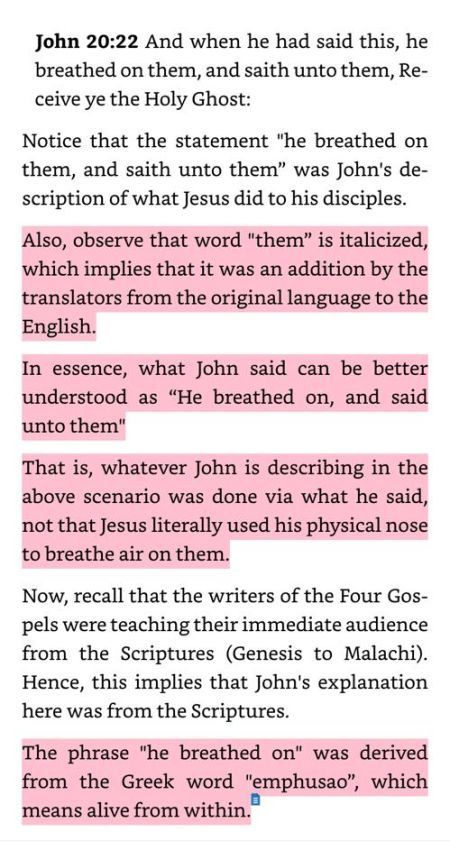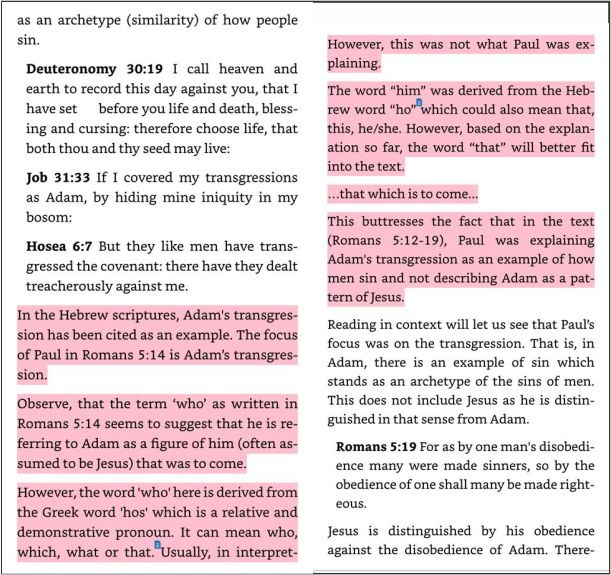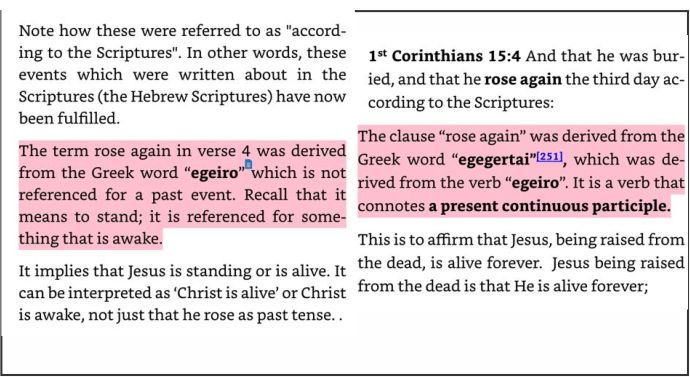REVD ONAYINKA's "GOD WHO BECAME JESUS": A REVIEW (2)
How not to use the Koine Greek in exegesis
The word ‘tech’ is derived from the Greek word ‘τέχνη (techne)’, which means ‘skill’. It was used 20 times before in different places referencing various skills. Therefore, anybody with a skill (any skill at all) is a Tech Bro.
Though many young folks would jump at the opportunity to be labeled a Tech Bro, most will immediately recognize that the above is simply flawed thinking. Yet, this is the kind of thinking (about how Greek words function) that pervades this book. If I could get one dollar for every time, the author1 says a Greek word implies this but doesn't really imply it at all—unless as the author's forced inference—I will be $10,000 richer.
I can't possibly cover all the semantic overloads, illegitimate totality transfer fallacies, root word fallacies, and much more; that is why I would recommend D. A. Carson's seminal work, "Exegetical Fallacies".
In this article, I will highlight few examples of the author's claim to a Greek exegesis which usually turns out to be downright sleight of hand.
As I am no Greek expert myself (only a faithful student), all of my analysis can be fact checked by consulting Jeremy Duff’s "The Elements of New Testament Greek" and D. F. Hudson’s "Teach Yourself New Testament Greek." As a bonus, I have just recommended good materials for you to start your Koine Greek journey.
Case Endings
2Surprisingly, this claim about the function of case endings is true. More surprising still is that the author hardly ever takes note of this in his exegesis. More on that soon.
However, this particular section demonstrates to me (and it might not be obvious to most lay readers) that the author has only copied this fact from somewhere without really being familiar with the concept. The case ending of the word “theos” is not “s” and “n” as claimed. The case ending is “-os” and “-on” while the root is “the-”. Small point, but such rookie mistake tells me a lot.
One would think the author will practice what he preaches, but he doesn’t. The word “he breathed on” in John 20:22 isn’t actually “emphusao” but “ἐνεφύσησεν(enephusesen)”
Three side notes before I proceed:
More often than not, when you boldly check your Strong’s dictionary and say “the Greek word of this is this”, you will be wrong. This is because dictionaries only give you the root word (without the case ending) and usually give only the nominative masculine singular of a word that may have over 24 other variants.
The actual Greek experts don’t analyze the Greek from its transliterated format because a lot can be missed. They analyze the Greek letters directly. So ἐνεφύσησεν is what we analyze and not enephusesen.
If all these already seem very complicated to you, the TL;DR is that unlike what this author wants to lead you to believe, you can trust your translations 95% of the time. The remaining 5% can be resolved by consulting multiple translations.
Back to business, ‘to breath upon’ cannot be done by ‘saying’ in this text because both verbs don’t even have the same aspects, hence cannot be conjoined. While “breathed on” is an aorist, “saith” is a present aspect. So while the breathing was one punctiliar action, the speaking was an extended action.
Now even though “them” is italicized, it is correctly added by the translators because it is common for the Greek to mention an object once even though two separate actions terminate on it. By mentioning the object twice; “on them”, the translator is helping you see that in Greek, it is two different actions on that same subject.
Now even though the author quotes the usage of the word ‘ἐνεφύσησεν(enephusesen)’ in the Septuagint, he conveniently leaves out the most relevant usage in the Septuagint that shows the breathing on is literal (maybe not literalistic).
Genesis 2:7- breathe into his nostrils, Ezekiel 21:31: blow upon you, Ezekiel 37:9: breathe on these slain.
It is evident, that ἐνεφύσησεν is not an intransitive action that has no object, but a transitive one that terminates on an object (them). The author is simply making things up.
How Arbitrary are Prepositions, Pronouns, and Conjunctions?
It is not uncommon to find this author imply in this material and other materials an arbitrariness of Greek prepositions, pronouns and conjunctions. You can find him changing what is translated as “if” in every translation to “since”, “and” to “also”, and claim that relative pronouns can be “who”, “which”, “that”, “what”. But things are not as he paints them.
Again much of the confusion comes from using dictionaries and transliterations.
In explaining Romans 5:14 the author is asserting that the word “who” can be “which”, “what” or “that”. Why does he do this?
“Nevertheless death reigned from Adam to Moses, even over them that had not sinned after the similitude of Adam's transgression, who is the figure of him that was to come.”
The author wants to claim that contrary to all the major translations, that verse should be translated as “Adam’s transgression which is the figure of that (other transgressions) to come”. This is one man with no qualifications vs thousands of PhD in Greek, New Testament studies, and Linguistics. Who knows, perhaps a miracle?
To start with, the relevant clause as it appears in the Greek manuscripts is":
“παραβάσεως Ἀδάμ, ὅς ἐστιν τύπος τοῦ μέλλοντος (parabaseos Adam, hos estin tupos tou mellontos).”
Now contrary to the author who said “The word ‘him’ is derived from the Hebrew [he somehow forgets that we are talking about Greek] word ‘ho’”, you would notice that ‘ho’ does not appear in that clause at all. He simply pulls it out of thin air.
The phrase, “of him that was to come” is translated from “τοῦ μέλλοντος (Tou mellontos)” which is a present active participle, genitive masculine singular. Now because it is masculine, whatever is being referred to will be assumed to be animate. This is opposed to a Neuter which will be inanimate. In other words, it is a person and not a thing. Because it is Genitive, it will carry an “of”. Hence it is translated “of him” not “of which” or “of that”
Now the word “hos” which often appears in the dictionary as “hos, he, o” represents a class of words with at least 24 variant forms, which can be “which”, “that”, “who”, “whom”, “whose”. But I warned you before not to use the dictionary (use the manuscript itself)3 to determine the Greek word, for it does not specify what variant appears.
Now the manuscript tells us that the word there is specifically ‘ὅς’ which means ‘who’; not ‘ὅ’ which means ‘which’ or ‘what’ depending on other rules; not ‘οὗ’ which means ‘whose’, etc. So what the word will mean in the sentence depends (at least in part) on the specific variant form that is found in the manuscript and not ‘hos, he, o’ that is found in the dictionary.
TL:DR: Contrary to the author’s claim that Romans 5:14 is not correctly translated by all the translations, it is correctly translated.
Can We Be Honest, Please?
In the left-hand picture, the author makes the same mistake he earlier lectured us on. He quotes the dictionary entry which does not have the case ending.
In the right-hand picture (it’s the same book), the author identifies the correct Greek word. Makes you wonder if this is really the work of a single author or does this single author have an incredible capacity to hold contradictory views.
But believe me, the second picture is more laughable. The word is ‘ἐγήγερται(egegertai)’. Now the footnote correctly says that this is the perfect tense form (which you cannot know without the case ending) which indicates a completed action with ongoing effects that continue in the present. The author then goes on to say that that same word is “a verb that connotes a present continuous participle”.
At this point, I let out a long laugh that puzzled my wife.
First of, there is nothing like ‘continuous participle in the Greek’. This is because two tenses in the Greek already have a built-in continuous aspect—present and imperfect. Present indicates an action that continues, extends or is being repeated in the moment. Imperfect indicates an action that occurred in the past but which extended over some time or was done repetitively.
Secondly, a word cannot both be perfect tense and present tense.
Thirdly, a word cannot both be a participle and a verb. A participle is a verbal adjective incorporating both the properties of a verb and an adjective.
TL;DR: What we have here is someone who has absolutely no idea of what he is saying while fronting as an expert, who even sits in translation committees. This is plain dishonesty that needs to end.
If this author is sure of his work, I dare him to submit it to a known, named, relevant expert for review who would publish his review independently (an anonymous review means nothing).
To impugn on the translations is to take away the confidence of believers in their Bible. It takes away one of the fundamental ethos of the protestant reformation which allows every believer to see God’s word for themselves, albeit with the guidance of tradition and honest teachers.
CONCLUSION
This is an urgent call for self-reflection on the part of this author who is towing a dangerous path that can lead to shipwreck of faith of not just himself, but the many that follow him.
This is an urgent call for ministers of the gospel to shun dishonesty, to stop inflating their credentials and stay within the limits of their competence while honestly working to improve.
This is an urgent call to every believer to be Berean. Please confirm whatever is being taught to you as much as lies with you. Ask questions, discuss with other believers.
Remember, there is a God who will judge us all and bring every hidden thing to light
16 Take heed unto thyself, and unto the doctrine; continue in them: for in doing this thou shalt both save thyself, and them that hear thee.
-1 Timothy 4:16
28 Take heed therefore unto yourselves, and to all the flock, over the which the Holy Ghost hath made you overseers, to feed the church of God, which he hath purchased with his own blood.
-Acts 20:28
Every time I reference “the author”, I refer to the author of the book under review: “God Who Became Jesus”
All paginations are referenced as seen on Amazon.com.
You get access to manuscripts through interlinear bibles. Stepbible.org is an excellent resource that gives you access to various manuscripts and translations






